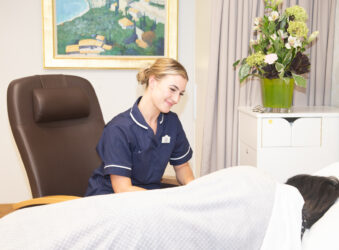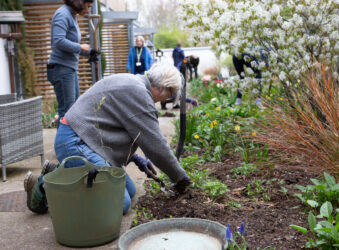Adapting to life changes following a palliative diagnosis
Share this article
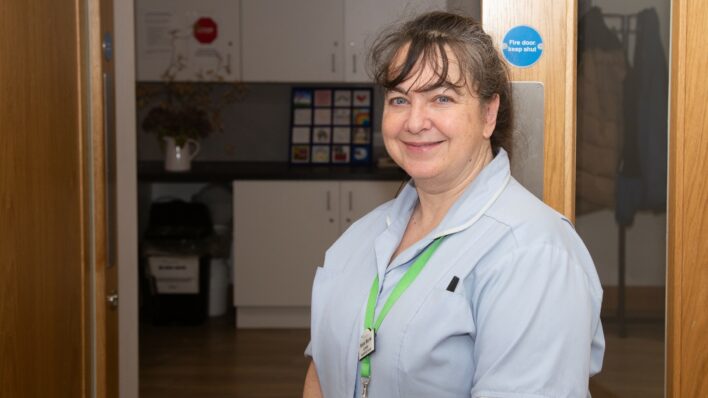
The Living Well service at the Hospice runs weekly sessions to support people in Cambridgeshire living with an advanced serious illness or other life-limiting condition. The sessions are delivered in a 12-week programme and patients may return to the Hospice for more than one programme, depending on need.
The programme aims are to provide participants with practical skills and knowledge to live well with an advanced serious illness or other life-limiting condition, as well as crucial peer support. Regular sessions are held in small groups, bringing people together to share their experiences, and 1 to 1 sessions with professionals for more specific and/or confidential advice if required.
Piers, aged 40 years old, has Muscular Dystrophy and attends the sessions and commented:
 “This is the best thing about this place – just because you haven’t got the same condition as another patient, they can give you life hacks and where you can sit there and learn off them and they can learn off you. So you just take bits out of different situations and then it’s so much easier to process.”
“This is the best thing about this place – just because you haven’t got the same condition as another patient, they can give you life hacks and where you can sit there and learn off them and they can learn off you. So you just take bits out of different situations and then it’s so much easier to process.”
Weekly discussion sessions include:
- Life Celebrations – Learning about memory boxes and recording life moments.
- Community / local support, financial concerns and benefits – Support for sourcing social care services, discussion and signposting to benefits.
- Eating healthily, looking & feeling well – Healthy eating to support well-being.
- Adapting to life’s changes – Dealing with the challenges that we face.
- Keeping Well and Active – Falls prevention and exercises to keep you fit and on your feet.
- Spirituality – Explore your spiritual side.
- Psychological well-being – A chance to slow down and consider how we can look after our psychological well-being.
- Celebrations – Your feedback to CEO!
- Intimacy and Relationships – Adapting to changes in a relationship following a palliative diagnosis.
- A Patient Experience – An opportunity for everyone to discuss being a living well patient and what it means to them.
- Future planning and dying well – Advanced care and a chance to discuss the dying process.
- Reflections: What Next? – Final week feedback: your chance to tell us how you have found this programme and ideas for improvement.
Anne Marie Lydon, Staff Nurse at the Living Well Service who leads on the delivery of the sessions said:
“The theme ‘Adapting to change’ was devised following conversations with patients as many were conversant of their circumstances and strategies relating to this subject. Patients have feedback to me that they felt the group was a ‘safe place’ to talk about their experiences.”
Supporting anxiety
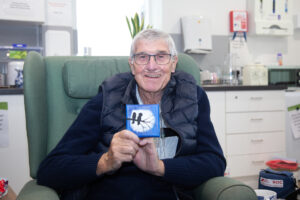 Ron attends the sessions and shared:
Ron attends the sessions and shared:
“Before I came, I’d heard a lot about the Hospice: all good. So, I was very happy to come here – and it is good. You know, I look forward to it. It’s such a nice way of spending half a day. It’s just relaxing and takes your cares away, because I suffer a lot with anxiety, and I find it helps here.”
Patients have also found the Supportive Wellbeing Videos on our website useful when they are at home. The videos, recorded by staff at the Hospice can be accessed arhc.org.uk/wellbeingvideos and include tips to support anxiety, advice on fatigue and sleep, breathlessness techniques , relaxation and mindfulness and much more.
Getting your ducks in a row
Jack attends the sessions and said:
“You can get help here too – they have helped me with practical things – like putting the bills in my wife’s name so she can access the accounts when I am not here. This gives me peace of mind.”
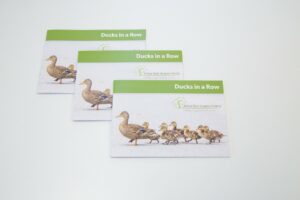 The Charity has also produced a ‘Ducks in a row’ booklet, which is available to anyone who would like to prepare for any eventuality in the future and will guide you through the process of recording your affairs, allowing you to collect information about your life in one place.
The Charity has also produced a ‘Ducks in a row’ booklet, which is available to anyone who would like to prepare for any eventuality in the future and will guide you through the process of recording your affairs, allowing you to collect information about your life in one place.
There are different sections such as:
- Your Information– to include your next of kin, dependents, pets, close friends etc.
• Your life contacts – to include your key health contacts
• Your documents – to include your birth certificate, driving licence, National Insurance numbers, NHS card, your Will etc.
• Your possessions and property section – to include mortgage or tenancy details, vehicles you own etc.
• Your contact section – to include work/voluntary contacts, home contacts, local traders (milk, newspapers, window cleaners etc.), organisation contacts (clubs, memberships etc.)
• Your finances – current and savings accounts, pensions, NS&I savings, regular payments, utility and key suppliers and accounts, insurance policies etc.
• Your final wishes – funeral plans, medical science, flowers or donations, after the funeral, special requests, special messages etc.
If you would like a copy of the Ducks in a Row booklet please contact Rachael Brown, Future Gift Manager on 01223 675881 or email r.brown@arhc.org.uk.
Advance Care Planning
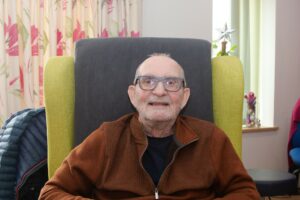 Ray attends the sessions and talked about the benefits to him and his wife:
Ray attends the sessions and talked about the benefits to him and his wife:
“The other good thing was the end-of-life sessions we did the last time we came here. It set our mind at rest a bit as to what the end would be like and how my wishes could be taken into account. That was very, very helpful. I mean, it’s not something everybody wants to do but you’ve got to do it sometime if you know you’re terminally ill. Even a simple thing like we know that when I go, the muscles in the lungs are going pack up first and the breathing’s going to relax. I didn’t know what that was going be like and she’s [Katie] has just put my mind at rest. We were able to talk about it calmly because we weren’t panicking and Nicky [my wife] would say the same, I think. I know now I can go forward without trepidation.”
The Advance Care Planning video, recorded by Clinical Nurse Specialist, Katie Williams, can be accessed on our website arhc.org.uk/wellbeingvideos and can be viewed alone or with loved ones, to start a conversation about preparing for your wishes.
Living independently
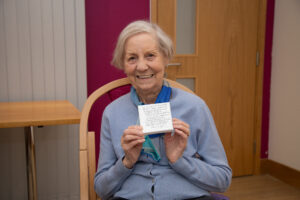 Lizzie attends the sessions and commented:
Lizzie attends the sessions and commented:
“The Living Well Team at the Hospice have given me passionate care and support helping managing my symptoms and encouragement to continue living independently, which is great comfort to be able to call on such a dedicated and caring team, thank you.”
For further information about the Living Well Service, please visit our website arhc.org.uk/living-well or email livingwell.service@arhc.org.uk or telephone 01223 675820.
Related articles
-

Hospice Volunteers recognised during National Volunteers Week 2025
Arthur Rank Hospice Charity says thank you to over 600 volunteers
-

Hospice delighted with the results of Quality Assurance Visit
Quality assurance visit was conducted as part of the Cambridgeshire and Peterborough Integrated Care Board (CPICB)
-

The Culture of Dying Matters for patients at Arthur Rank Hospice Charity
Read how the Charity supports patients individual needs
-

Hospice Volunteer Gardeners makeover the Inpatient Unit gardens
Volunteer gardeners support Hospice patients and their loved ones


